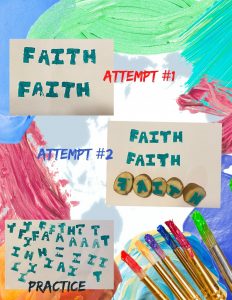
I love to read! I have never educated myself in the history of how books came to be mainstream in our societies. Thinking about the time and effort it took to create a codex while listening to the Stuff to Blow Your Mind podcast gave me a new appreciation for our ancestors and their effort in spreading information through the use of books.
I set out to complete a potato printing thinking it would be both quick and easy. After creating my letters and cutting them out, I quickly realized I forgot to make them in reverse! The word I chose, faith, only needed one letter re-done as I wrote in capitals and the other letters looked the same either way. If I had needed to re-do all the letters, I would have been very frustrated! I found it challenging to space the letters properly and the potatoes were awkward to hold. The amount of pressure I applied affected the look of the letter. I had to practice on a sheet of paper multiple times for each letter to ensure I could make the print look similar. After my first attempt, I decided to try and improve my letters by making edges sharper and the face of the letter as flat as possible to create a better print. The entire process took about one hour. I did find the process during my second attempt to begin to be therapeutic and enjoyable the same way Collier describes using a letter press (Cooke, 2012).
I can appreciate the mechanization of writing as writing technologies have greatly increased our ability to share information in a timely manner. If our culture had not experienced the mechanization of writing, our world would currently look very different. Bolter’s (2001) observation that as new technologies emerge they replace or supplement the established one holds true in my experience (p.26). From writing essays in high school, to typing and then printing them in my undergrad, and finally typing and posting them online in my master’s degree. Each change in technology has supplemented the technology I used before it and eventually replaced it fully. Each one has also increased the speed at which I can share information with others. I am very thankful for the mechanization of writing.
References:
Bolter, Jay David. (2001). Writing space: Computers, hypertext, and the remediation of print [2nd edition]. Mahwah, NJ: Lawrence Erlbaum.
Cooke, Danny (2012). Upside down, left to right: a letterpress film. https://www.youtube.com/watch?v=n6RqWe1bFpM